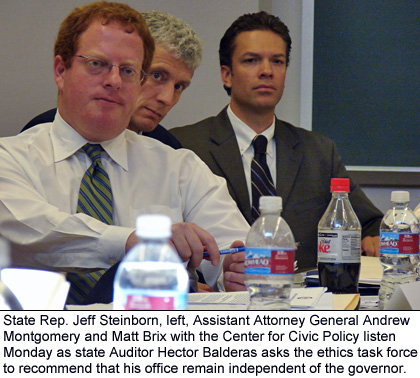
 State Auditor Hector Balderas urged the Task Force on Ethics Reform during a meeting Monday in Socorro to recommend that his office remain independent of the governor.
State Auditor Hector Balderas urged the Task Force on Ethics Reform during a meeting Monday in Socorro to recommend that his office remain independent of the governor.
The task force didn’t make a final decision on whether to recommend that the auditor become an appointed, instead of elected, position. The group is also considering whether to recommend, if the auditor remains independent, placing requirements on who can run for the office.
I wrote last year that I believe the auditor should remain an elected position. But Monday’s discussion shed some interesting light on the debate about how to improve the system.
Balderas, during the meeting at the Joseph R. Skeen Library on the campus of New Mexico Tech, said independence is critical to the auditor’s ability to do his job.
“If we limit my ability to be independent, we may be limiting my ability to look into the 300 allegations that we have of fraud and mismanagement,” he told the group.
Balderas, who is an attorney, not a certified public accountant, talked about his attempts to be aggressive in the pursuit of fraud and mismanagement since he took office in January, including the implementation of a fraud hotline and the use of the subpoena power the office is granted but has not utilized in the past.
“In the last 6-7 months, we have begun a new vision for this office,” he said, adding that he could not have done that without independence.
Task force members seemed to agree that, in principle, the auditor should be independent, but many also said the auditor must be qualified for the job, and making the position an appointed one might ensure that candidates with better qualifications are selected. Some members agreed that new criteria might need to be put in place – such as requiring that the auditor is a CPA, fraud examiner or attorney – but others argued that such a change wouldn’t be enough. Such requirements would have to be added to the
Task force member Geno Zamora pointed out that the attorney general has to be an attorney.
“There need to be requirements that relate to the specialized need of the auditor’s office,” he said.
Several members of the task force agreed that Balderas is doing an excellent job in the auditor’s office, but expressed concern about what happens when he leaves office if new requirements aren’t in place. Currently, there are no special qualifications required to run for state auditor.
Task force member Jim Noel, director of the state’s judicial standards commission, said he believes the auditor should remain independent, but the problem “is that the elections are held every four years and so, in the interim, if something happens there’s really no forum, there’s no venue” for addressing problems except impeachment. An appointed auditor could be disciplined for offenses that don’t rise to the level of requiring removal, but there’s currently no mechanism in state law for discipline of statewide elected officials.
Noel said that’s one reason to support the creation of a state ethics commission, “but it needs to have the teeth and the ability constitutionally to sideline a public official… while there’s a problem that’s being addressed.”
“What happens when someone is in there that isn’t as good or as conscientious or as ethical as you?” Noel asked Balderas.
Balderas, who as a former lawmaker participated in the preparation of impeachment proceedings against former state Treasurer Robert Vigil, who resigned before proceedings commenced, said the system worked.
“It was the independent check that was the genius and gave us the balance to be deliberate and fair,” he said.
Will increased funding be necessary?
Balderas also said his office, if strengthened through additional funding, could become a powerful tool for preventing problems. He said that, by the time indictments and impeachment proceedings come around, “we’ve already lost.”
“The state auditor can be a very, very important tool in bringing accountability in government, which is really what I think we’re all trying to get at,” he said. “I only hope that you would look at me and my office as a potential solution.”
In addition to increased funding, Balderas said the penalty for malfeasance should be increased. Right now, the penalty is a misdemeanor.
“That’s ludicrous when I oversee $60 billion,” he said.
Throughout the day, the discussion turned toward a need to more adequately fund the auditor, the attorney general’s division that tracks public corruption and the secretary of state’s ethics division, which is responsible for public disclosure of money in state politics. The task force is also taking a look at a number of reform proposals made by Attorney General Gary King that would strengthen his office’s authority, and potential changes in the secretary of state’s office to increase transparency.
House Majority Leader Ken Martinez of Grants said the task force should consider a recommendation to the governor “that we fully staff these issues across the board – transparency, investigation and prosecution.”
The task force discussed a number of other proposals, including elections and ethics commissions and transparency and procurement issues. The group plans to meet again on Aug. 7 and 30 in
There’s a lot more to analyze from Monday’s meeting. I’ll probably write about specific ethics reforms being considered throughout the rest of this week, so check back.